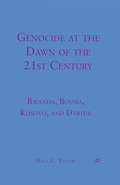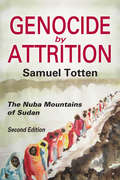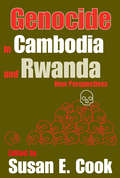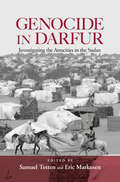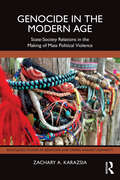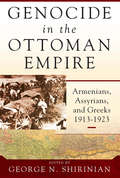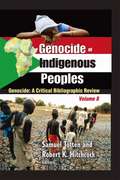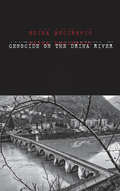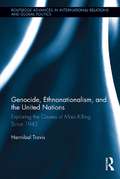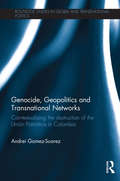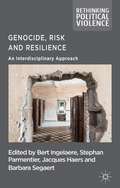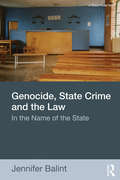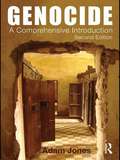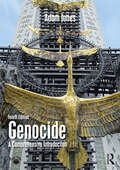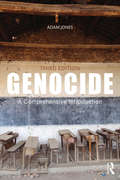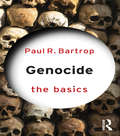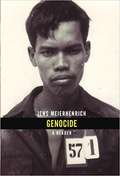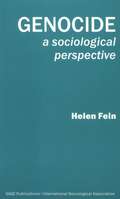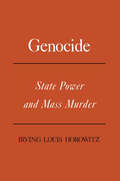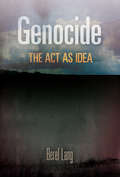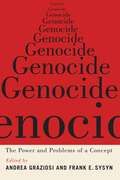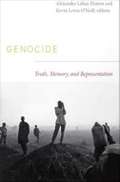- Table View
- List View
Genocide at the Dawn of the Twenty-First Century
by Dale C. TatumAt the end of World War II, the international community deemed genocide a crime against humanity. Yet, at the dawn of the twenty-first century it has occurred repeatedly. This book explains why genocide began to occur in the twenty-first century and why the United States has been ineffective at preventing it and stopping it once it occurs.
Genocide at the Millennium (Critical Bibliographic Review Ser. #Vol. 5)
by Samuel Totten"Genocide at the Millennium is the fifth volume in the acclaimed series Genocide: A Critical Bibliographical Review. This latest volume's focus is both the genocidal activity that has taken place over the past fourteen years (including that in Rwanda and the former Yugoslavia) as well as a critique of the international community's response to genocide and potential genocidal situations (including those of the United Nations and nongovernmental organizations).Genocide at the Millennium is divided into ten chapters. The opening chapter treats the Yugoslav genocide, discussing the causes of the conflict, the violence that ensued, the reaction of the international community, and the ramifications that are still being felt in that part of the world today. Chapter 2 provides a detailed and thought-provoking examination of the causes, results and ramifications of the 1994 Rwandan genocide. Chapter 3 examines the conflict in Kosovo and the events surrounding the controversial intervention by NATO. Chapter 4 discusses the remarkable efforts and successes that various non-governmental agencies have had in addressing a wide variety of issues related to genocide. Chapter 5 examines the United Nations' efforts to address the issue of genocide at the turn of the century. The role of individual states confronting issues and cases of genocide is analyzed in chapter 6. Chapter 7 gives a solid overview of the evolution of international law as it pertains to the crime of genocide and how and why major changes in such law have begun to take place in the 1990s and early 2000s. The international criminal tribunals for Rwanda and the former Yugoslavia are considered in chapters 8 and 9. The concluding chapter provides an extremely detailed and highly informative overview of key aspects of the International Criminal Court.In keeping with the multidisciplinary approach of previous volumes in the series, each of the essays and accompanying annotated"
Genocide by Attrition: The Nuba Mountains of Sudan (Genocide Studies)
by Samuel TottenThis volume documents the Sudanese government's campaign of genocidal attacks and forced starvation against the people of the Nuba Mountains in the late 1980s and early 1990s. Genocide by Attrition provides powerful insights and analysis of the phenomenon and bears witness to ongoing atrocities.This second edition features more interviews, a new introduction, and a revised and more detailed historical overview. Among the themes that link most of the interviews are: the political and economic disenfranchisement of the Nuba people by the government of Sudan; the destruction of villages and farms and the murder and deaths of the Nuba people; the forced relocation into so-called "peace camps" and the impact of forced starvation. The book also documents the frustration of the Nuba people at being left out of the Comprehensive Peace Agreement signed between the South and the North in 2005, President Omar al Bashir's threats against the Nuba people, and the crisis in the Nuba Mountains since June 2011.Genocide by Attrition provides a solid sense of the antecedents to the genocidal actions in the Nuba Mountains. It introduces the main actors, describes how the Nuba were forced into starvation by their government, and tells how those who managed to survive did so. Samuel Totten provides a valuable resource to study the imposition of starvation as a tool of genocide.
Genocide in Cambodia and Rwanda: New Perspectives
by Susan E. CookThis volume deals with aspects of genocide in Rwanda and Cambodia that have been largely unexplored to date, including the impact of regional politics and the role played by social institutions in perpetrating genocide. Although the "story" of the Cambodian genocide of 1975-1979 and that of the Rwandan genocide of 1994 have been written about in detail, most have focused on how the genocides took place, what the ideas and motives were that led extremist factions to attempt to kill whole sections of their country's population, and who their victims were. This volume builds on our understanding of genocide in Cambodia and Rwanda by bringing new issues, sources, and approaches into focus. The chapters in this book are grouped so that a single theme is explored in both the Cambodian and Rwandan contexts; their ordering is designed to facilitate comparative analysis. The first three chapters emphasize the importance of political discourse in the genocidal process. Chapters 4 and 5 examine social institutions and explore their role in the genocidal process. Chapters 6 and 7 describe the military trajectories of the genocidal regimes in Cambodia and Rwanda after their overthrow, showing that genocide and genocidal intents as a political program do not cease the moment the massacres subside. The final chapters deal with private and public efforts to memorialize the genocides in the months and years following the killing. Drawing on ten years of genocide studies at Yale, this excellent anthology assembles high-quality new research from a variety of continents, disciplines, and languages. It will be an important addition to ongoing research on genocide.
Genocide in Darfur: Investigating the Atrocities in the Sudan
by Samuel Totten Eric MarkusenIn response to the ongoing mass murder of Black Sudanese groups in the Darfur region of Sudan by Sudanese government troops and Arab militias, the US government sent the Darfur Atrocities Documentation Team to various points along the Chad/Sudan in order to interview refugees from Darfur. Based on their investigation, US Secretary of State Colin Powell formally announced that ‘genocide has occurred in Darfur and may still be occurring.’ The United States officially accused the government of Sudan of perpetrating genocide - the first time that any government has officially and publicly accused another government of genocide. As a result the United States played a key role in pressuring the United Nations Security Council to pass a resolution calling for several measures, including an official UN Commission of Inquiry to conduct a genocide investigation in Sudan itself. This was the first time that any signatory of the Genocide Convention actually triggered provisions of the Convention requiring a UN Security Council response while genocide was occurring. This book is comprised of essays from contributors who were involved in designing the project and hiring and training investigators, interpreters, and support personnel; US government and nongovernmental organization (NGO) officials involved in the genesis of the project as well as the analysis of the data; and numerous scholars, not all of whom were directly involved with the project, who critique aspects of the documentation project as well as its significance.
Genocide in the Modern Age: State-Society Relations in the Making of Mass Political Violence (Routledge Studies in Genocide and Crimes against Humanity)
by Zachary A. KarazsiaThis book explores why some episodes of mass political violence and genocide are so much deadlier than others and under what conditions perpetrators in government and society opt for brutality as a means of accomplishing their goals. Introducing the new concept of "mass political violence" to explain genocide and other mass killings in the modern world, the author investigates "how" perpetrators sustain the capacity to enact violence on a large-scale, irrespective of motives. Cases including the Holocaust, Soviet Union, Rwanda, Cambodia, the Lord’s Resistance Army, the Islamic State, the Ottoman Empire of the 1890s, Mao Zedong’s revolutionary violence, the Congo Crisis, and Darfur are used by the author to identify four types of mass political violence perpetrators – state actors, state-society coalitions, state-sponsored groups, and non-state actors to explain historical trends and identify which perpetrators are most likely to emerge in a given socio-political context and sustain violence over time. Comparative and grounded in case studies, this book will interest policymakers, diplomats, governmental advisers, practitioners, and industry researchers. It will also be invaluable to students and scholars of Political Science, International Affairs, Holocaust and Genocide Studies, Human Rights, Sociology, Anthropology, Geography, Political Psychology, Religious Studies, Gender Studies, Public Policy, Media Studies, and Criminology.
Genocide in the Ottoman Empire: Armenians, Assyrians, and Greeks, 1913-1923
by George N. ShirinianThe final years of the Ottoman Empire were catastrophic ones for its non-Turkish, non-Muslim minorities. From 1913 to 1923, its rulers deported, killed, or otherwise persecuted staggering numbers of citizens in an attempt to preserve "Turkey for the Turks," setting a modern precedent for how a regime can commit genocide in pursuit of political ends while largely escaping accountability. While this brutal history is most widely known in the case of the Armenian genocide, few appreciate the extent to which the Empire's Assyrian and Greek subjects suffered and died under similar policies. This comprehensive volume is the first to broadly examine the genocides of the Armenians, Assyrians, and Greeks in comparative fashion, analyzing the similarities and differences among them and giving crucial context to present-day calls for recognition.
Genocide of Indigenous Peoples: A Critical Bibliographic Review (Genocide: A Critical Bibliographic Review Ser.)
by Samuel Tottena and Robert K. HitchcockAn estimated 350 to 600 million indigenous people reside across the globe. Numerous governments fail to recognize its indigenous peoples living within their borders. It was not until the latter part of the twentieth century that the genocide of indigenous peoples became a major focus of human rights activists, non-governmental organizations, international development and finance institutions such as the United Nations and the World Bank, and indigenous and other community-based organizations. Scholars and activists began paying greater attention to the struggles between Fourth World peoples and First, Second, and Third World states because of illegal actions of nation-states against indigenous peoples, indigenous groups' passive and active resistance to top-down development, and concerns about the impacts of transnational forces including what is now known as globalization. This volume offers a clear message for genocide scholars and others concerned with crimes against humanity and genocide: much greater attention must be paid to the plight of all peoples, indigenous and otherwise, no matter how small in scale, how little-known, how "invisible" or hidden from view.
Genocide on the Drina River
by Ms Edina BecirevicIn this scholarly yet intensely personal history, author Edina Becirevic explores the widespread ethnic cleansing that occurred in Bosnia and Herzegovina from 1992 through 1995, war crimes and crimes against humanity committed by Serbs against Bosnian Muslims that fully meet the criteria for genocide established after World War II by the Genocide Convention of 1948. An in-depth study of the devastating and dehumanizing effects of genocide on individual destinies and the mechanisms of its denial in Bosnia and Herzegovina, Becirevic's essential history contextualizes the East Bosnian program of atrocities with respect to broader scholarly debates about the nature of genocide.
Genocide, Ethnonationalism, and the United Nations: Exploring the Causes of Mass Killing Since 1945 (Routledge Advances in International Relations and Global Politics)
by Hannibal TravisGenocide, Ethnonationalism, and the United Nations examines a series of related crises in human civilization growing out of conflicts between powerful states or empires and indigenous or stateless peoples. This is the first book to attempt to explore the causes of genocide and other mass killing by a detailed exploration of UN archives covering the period spanning from 1945 through 2011. Hannibal Travis argues that large states and empires disproportionately committed or facilitated genocide and other mass killings between 1945 and 2011. His research incorporates data concerning factors linked to the scale of mass killing, and recent findings in human rights, political science, and legal theory. Turning to potential solutions, he argues that the concept of genocide imagines a future system of global governance under which the nation-state itself is made subject to law. The United Nations, however, has deflected the possibility of such a cosmopolitical law. It selectively condemns genocide and has established an institutional structure that denies most peoples subjected to genocide of a realistic possibility of global justice, lacks a robust international criminal tribunal or UN army, and even encourages "security" cooperation among states that have proven to be destructive of peoples in the past. Questions raised include: What have been the causes of mass killing during the period since the United Nations Charter entered into force in 1945? How does mass killing spread across international borders, and what is the role of resource wealth, the arms trade, and external interference in this process? Have the United Nations or the International Criminal Court faced up to the problem of genocide and other forms of mass killing, as is their mandate?
Genocide, Geopolitics and Transnational Networks: Con-textualising the destruction of the Unión Patriótica in Colombia (Routledge Studies in Global and Transnational Politics)
by Andrei Gomez-SuarezThis volume seeks to uncover and discuss the links between genocide, geopolitics and transnational networks. By studying the destruction of the Union Patrotica (UP) in Colombia - a process usually regarded as one of the extreme by-products of the Colombian armed conflict- through the lens of genocide studies, Gomez-Suarez challenges mainstream international relations, genocide and Colombian armed conflict studies. Moving beyond the analysis of the Colombian case, the book offers a broader interdisciplinary theoretical framework that also attends to transnational relations of perpetrators and resisters and the political economy of affective-dispositions for mapping genocidal conjuncture. Methodologically, the text aims to present a re-interpretation of what constitutes genocide beyond its legal definition and turn towards its political and ethical dimensions to create a conceptual framework in which genocide appears to turn ever more into a decentralized network of various actors that contributed to a genocidal mentality, which, ultimately, enable the destruction of the civil society networks. This work will be an important contribution to both the debates on genocide and international relations and the study of global connectivities.
Genocide, Risk and Resilience
by Bert IngelaereThis interdisciplinary volume aims to understand the linkages between the origins and aftermaths of genocide. Exploring social dynamics and human behaviour, this collection considers the interplay of various psychological, political, anthropological and historical factors at work in genocidal processes.
Genocide, State Crime and the Law: In the Name of the State
by Jennifer BalintGenocide, State Crime and the Law critically explores the use and role of law in the perpetration, redress and prevention of mass harm by the state. In this broad ranging book, Jennifer Balint charts the place of law in the perpetration of genocide and other crimes of the state together with its role in redress and in the process of reconstruction and reconciliation, considering law in its social and political context. The book argues for a new approach to these crimes perpetrated 'in the name of the state' - that we understand them as crimes against humanity with particular institutional dimensions that law must address to be effective in accountability and as a basis for restoration. Focusing on seven instances of state crime - the genocide of the Armenians by the Ottoman state, the Holocaust and Nazi Germany, Cambodia under the Khmer Rouge, apartheid South Africa, Ethiopia under Mengistu and the Dergue, the genocide in Rwanda, and the conflict in the former Yugoslavia - and drawing on others, the book shows how law is companion and collaborator in these acts of nation-building by the state, and the limits and potentials of law's constitutive role in post-conflict reconstruction. It considers how law can be a partner in destruction yet also provide a space for justice. An important, and indeed vital, contribution to the growing interest and literature in the area of genocide and post-conflict studies, Genocide, State Crime and the Law will be of considerable value to those concerned with law's ability to be a force for good in the wake of harm and atrocity.
Genocide: A Comprehensive Introduction
by Adam JonesGenocide: A Comprehensive Introduction is the most wide-ranging textbook on genocide yet published. The book is designed as a text for upper-undergraduate and graduate students, as well as a primer for non-specialists and general readers interested in learning about one of humanity's enduring blights. Fully updated to reflect the latest thinking in this rapidly developing field, this new edition: provides an introduction to genocide as both a historical phenomenon and an analytical-legal concept, including an extended discussion of the concept of genocidal intent, and the dynamism and contingency of genocidal processes discusses the role of state-building, imperialism, war, and social revolution in fueling genocide supplies a wide range of full-length case studies of genocides worldwide, each with an accompanying box-text explores perspectives on genocide from the social sciences, including psychology, sociology, anthropology, political science/international relations, and gender studies considers "The Future of Genocide," with attention to historical memory and genocide denial; initiatives for truth, justice, and redress; and strategies of intervention and prevention. Written in clear and lively prose, liberally sprinkled with over 100 illustrations and maps, and including personal testimonies from genocide survivors,Genocide: A Comprehensive Introductionhas established itself as the core textbook of the new generation of genocide scholarship. An accompanying website (www. genocidetext. net) features a broad selection of supplementary materials, teaching aids, and Internet resources.
Genocide: A Comprehensive Introduction
by Adam JonesGenocide: A Comprehensive Introduction is the most wide-ranging textbook on genocide yet published. The book is designed as a text for upper-undergraduate and graduate students, as well as a primer for non-specialists and general readers interested in learning about one of humanity's enduring blights. Fully updated to reflect the latest thinking in this rapidly developing field, this new edition: provides an introduction to genocide as both a historical phenomenon and an analytical-legal concept, including an extended discussion of the concept of genocidal intent, and the dynamism and contingency of genocidal processes discusses the role of state-building, imperialism, war, and social revolution in fueling genocide supplies a wide range of full-length case studies of genocides worldwide, each with an accompanying box-text explores perspectives on genocide from the social sciences, including psychology, sociology, anthropology, political science/international relations, and gender studies considers "The Future of Genocide," with attention to historical memory and genocide denial; initiatives for truth, justice, and redress; and strategies of intervention and prevention. Written in clear and lively prose, liberally sprinkled with over 100 illustrations and maps, and including personal testimonies from genocide survivors, Genocide: A Comprehensive Introduction has established itself as the core textbook of the new generation of genocide scholarship. An accompanying website (www.genocidetext.net) features a broad selection of supplementary materials, teaching aids, and Internet resources.
Genocide: A Comprehensive Introduction
by Adam JonesGenocide: A Comprehensive Introduction is the most wide-ranging textbook on genocide yet published. Designed as a text for undergraduate and graduate students from a range of disciplines, it will also appeal to non-specialists and general readers. Fully updated to reflect the latest thinking in this rapidly developing field, this unique book: Provides an introduction to genocide as both a historical phenomenon and an analytical-legal concept, including the concept of genocidal intent and the dynamism and contingency of genocidal processes. Discusses the role of state-building, imperialism, war, and social revolution in fueling genocide. Supplies a wide range of full-length case studies of genocides worldwide, each with a supplementary study. Explores perspectives on genocide from the social sciences, including psychology, sociology, anthropology, political science/international relations, and gender studies. Considers the future of genocide, with attention to historical memory and genocide denial; initiatives for truth, justice, and redress; and strategies of intervention and prevention. Highlights of the new edition include: New case studies of the Uyghur genocide in the People’s Republic of China, the Rohingya Muslims of Myanmar, and Muslims in India. The historical and archaeological legacy of genocide. New and vivid testimonies of survivors and witnesses to genocide. This significantly revised fourth edition will remain an indispensable text for new generations of genocide study and scholarship. An accompanying website (www.genocidetext.net) features a selection of supplementary materials, teaching aids, and Internet resources.
Genocide: A Comprehensive Introduction
by Adam JonesGenocide: A Comprehensive Introduction is the most wide-ranging textbook on genocide yet published. The book is designed as a text for upper-undergraduate and graduate students, as well as a primer for non-specialists and general readers interested in learning about one of humanity’s enduring blights.Fully updated to reflect the latest thinking in this rapidly developing field, this unique book: Provides an introduction to genocide as both a historical phenomenon and an analytical-legal concept, including the concept of genocidal intent, and the dynamism and contingency of genocidal processes. Discusses the role of state-building, imperialism, war, and social revolution in fuelling genocide. Supplies a wide range of full-length case studies of genocides worldwide, each with a supplementary study. Explores perspectives on genocide from the social sciences, including psychology, sociology, anthropology, political science/international relations, and gender studies. Considers "The Future of Genocide," with attention to historical memory and genocide denial; initiatives for truth, justice, and redress; and strategies of intervention and prevention. Highlights of the new edition include: Nigeria/Biafra as a "contested case" of genocide Extensive new material on the Kurds, Islamic State/ISIS, and the civil wars/genocide in Iraq and Syria. Conflict and atrocities in the world’s newest state, South Sudan. The role, activities, and constraints of the United Nations Office of Genocide Prevention. Many new testimonies from genocide victims, survivors, witnesses—and perpetrators. Dozens of new images, including a special photographic essay. Written in clear and lively prose with over 240 illustrations and maps, Genocide: A Comprehensive Introduction remains the indispensable text for new generations of genocide study and scholarship.An accompanying website (www.genocidetext.net) features a broad selection of supplementary materials, teaching aids, and Internet resources.
Genocide: A Comprehensive Introduction (Sage Library Of International Relations)
by Adam JonesGenocide: A Comprehensive Introduction is the most wide-ranging textbook on genocide yet published. The book is designed as a text for upper-undergraduate and graduate students, as well as a primer for non-specialists and general readers interested in learning about one of humanity’s enduring blights. Fully updated to reflect the latest thinking in this rapidly developing field, this unique book: Provides an introduction to genocide as both a historical phenomenon and an analytical-legal concept, including the concept of genocidal intent, and the dynamism and contingency of genocidal processes. Discusses the role of state-building, imperialism, war, and social revolution in fuelling genocide. Supplies a wide range of full-length case studies of genocides worldwide, each with a supplementary study. Explores perspectives on genocide from the social sciences, including psychology, sociology, anthropology, political science/international relations, and gender studies. Considers "The Future of Genocide," with attention to historical memory and genocide denial; initiatives for truth, justice, and redress; and strategies of intervention and prevention. Highlights of the new edition include: Nigeria/Biafra as a "contested case" of genocide Extensive new material on the Kurds, Islamic State/ISIS, and the civil wars/genocide in Iraq and Syria. Conflict and atrocities in the world’s newest state, South Sudan. The role, activities, and constraints of the United Nations Office of Genocide Prevention. Many new testimonies from genocide victims, survivors, witnesses—and perpetrators. Dozens of new images, including a special photographic essay. Written in clear and lively prose with over 240 illustrations and maps, Genocide: A Comprehensive Introduction remains the indispensable text for new generations of genocide study and scholarship. An accompanying website (www.genocidetext.net) features a broad selection of supplementary materials, teaching aids, and Internet resources.
Genocide: A Documentary And Reference Guide (The Basics)
by Paul R. BartropGenocide: The Basics is an engaging introduction to the study of a controversial and widely debated topic. This concise and comprehensive book explores key questions such as; how successful have efforts been in the prevention of genocide? How prevalent has genocide been throughout history? and how has the concept been defined? Real world case studies address significant issues including: The killing of indigenous peoples by colonial powers The Holocaust and the question of "uniqueness" Peacekeeping efforts in the 1990s Legal attempts to create a genocide-free world With suggestions for further reading, discussion questions at the end of each chapter and a glossary of key terms, Genocide: The Basics is the ideal starting point for students approaching the topic for the first time.
Genocide: A Reader
by Jens MeierhenrichGenocide is a phenomenon that continues to confound scholars, practitioners, and general readers. Notwithstanding the carnage of the twentieth century, our understanding of genocide remains partial. Disciplinary boundaries have inhibited integrative studies and popular, moralizing accounts have hindered comprehension by advancing simple truths in an area where none are to be had. <P><P>Genocide: A Reader lays the foundations for an improved understanding of genocide. With the help of 150 essential contributions, Jens Meierhenrich provides a unique introduction to the myriad dimensions of genocide and to the breadth and range of critical thinking that exists concerning it. This innovative anthology offers genre-defining as well as genre-bending selections from diverse disciplines - in law, the social sciences, and the humanities - as well as from other fields. A wide-ranging introductory chapter on the study and history of genocide accompanies the carefully curated and annotated collection. By revisiting the past of genocide studies and imagining its future, Genocide: A Reader is an indispensable resource for novices and specialists alike.
Genocide: A Sociological Perspective
by Helen FeinThe book outlines the nature and history of genocide, summarizing the existing state and understanding of its definition, causation and prevention.
Genocide: State Power and Mass Murder (Issues In Contemporary Civilization Ser.)
by James BaldwinThis book is dedicated to a consideration of genocide in the context of political sociology. It demonstrates that the underlining predicates of sociology give scant consideration to basic issues of life and death in favor of distinctly derivative issues of social structure and social function.
Genocide: The Act as Idea (Pennsylvania Studies in Human Rights)
by Berel LangThe term "genocide"--"group killing"--which first appeared in Raphael Lemkin's 1944 book, Axis Rule in Occupied Europe, had by 1948 established itself in international law through the United Nations Convention on the Prevention and Punishment of the Crime of Genocide. <P><P>Since then the charge of genocide has been both widely applied but also contested. In Genocide: The Act as Idea, Berel Lang examines and illuminates the concept of genocide, at once articulating difficulties in its definition and proposing solutions to them. In his analysis, Lang explores the relation of genocide to group identity, individual and corporate moral responsibility, the concept of individual and group intentions, and the concept of evil more generally. <P><P>The idea of genocide, Lang argues, represents a notable advance in the history of political and ethical thought which proposed alternatives to it, like "crimes against humanity," fail to take into account.
Genocide: The Power and Problems of a Concept
by Andrea Graziosi and Frank E. SysynSince the 1980s the study of genocide has exploded, both historically and geographically, to encompass earlier epochs, other continents, and new cases. The concept of genocide has proved its worth, but that expansion has also compounded the tensions between a rigid legal concept and the manifold realities researchers have discovered. The legal and political benefits that accompany genocide status have also reduced complex discussions of historical events to a simplistic binary – is it genocide or not? – a situation often influenced by powerful political pressures.Genocide addresses these tensions and tests the limits of the concept in cases ranging from the role of sexual violence during the Holocaust to state-induced mass starvation in Kazakh and Ukrainian history, while considering what the Armenian, Rwandan, and Burundi experiences reveal about the uses and pitfalls of reading history and conducting politics through the lens of genocide. Contributors examine the pressures that great powers have exerted in shaping the concept; the reaction Raphaël Lemkin, originator of the word “genocide,” had to the United Nations’ final resolution on the subject; France’s long-held choice not to use the concept of genocide in its courtrooms; the role of transformative social projects and use of genocide memory in politics; and the relation of genocide to mass violence targeting specific groups.Throughout, this comprehensive text offers innovative solutions to address the limitations of the genocide concept, while preserving its usefulness as an analytical framework.
Genocide: Truth, Memory, and Representation
by Kevin Lewis O'Neill Alexander Laban HintonWhat happens to people and the societies in which they live after genocide? How are the devastating events remembered on the individual and collective levels, and how do these memories intersect and diverge as the rulers of postgenocidal states attempt to produce a monolithic "truth" about the past? In this important volume, leading anthropologists consider such questions about the relationship of genocide, truth, memory, and representation in the Balkans, East Timor, Germany, Guatemala, Indonesia, Nigeria, Rwanda, Sudan, and other locales. Specialists on the societies about which they write, these anthropologists draw on ethnographic research to provide on-the-ground analyses of communities in the wake of mass brutality. They investigate how mass violence is described or remembered, and how those representations are altered by the attempts of others, from NGOs to governments, to assert "the truth" about outbreaks of violence. One contributor questions the neutrality of an international group monitoring violence in Sudan and the assumption that such groups are, at worst, benign. Another examines the consequences of how events, victims, and perpetrators are portrayed by the Rwandan government during the annual commemoration of that country's genocide in 1994. Still another explores the silence around the deaths of between eighty and one hundred thousand people on Bali during Indonesia's state-sponsored anticommunist violence of 1965-1966, a genocidal period that until recently was rarely referenced in tourist guidebooks, anthropological studies on Bali, or even among the Balinese themselves. Other contributors consider issues of political identity and legitimacy, coping, the media, and "ethnic cleansing. " Genocide: Truth, Memory, and Representation reveals the major contribution that cultural anthropologists can make to the study of genocide. Contributors. Pamela Ballinger, Jennie E. Burnet, Conerly Casey, Elizabeth Drexler, Leslie Dwyer, Alexander Laban Hinton, Sharon E. Hutchinson, Uli Linke, Kevin Lewis O'Neill, Antonius C. G. M. Robben, Debra Rodman, Victoria Sanford
